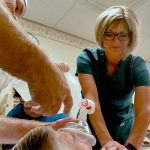First celebrated in 1933, National Doctors’ Day is an annual holiday honoring physicians for their compassion, integrity, and dedication to patient care and medical advancements. At RQI Partners, we are proud to celebrate this holiday by highlighting several physicians who have pioneered and championed resuscitation excellence.
Prior to adopting RQI in 2014, The Ohio State University Wexner Medical Center (OSUWMC) was combining traditional, instructor-led CPR classes in a variety of formats to maintain course certification cards for clinical staff. Dr. Ashish Panchal fully embraced the introduction of the new learning format, highlighting it as a positive culture change for the organization.
Oftentimes, CPR is not a routine practice for many direct care providers. In fact, some rarely perform CPR other than during their traditional bi-annual training. With a lack of use and practice, CPR compression and ventilation skills degrade and overall CPR effectiveness is reduced, negatively affecting potential patient outcomes. For Dr. Panchal, the RQI program provided a crucial opportunity to improve training quality and staff competence at OSUWMC.
“In any large institution, you will always have challenges when making large-scale changes to pull people into a new dynamic … It starts with buy-in and understanding what the final goal is: the final goal is saving another life. That’s our goal. That is the paramount important thing we are all striving towards.”
Ashish Panchal, MD, PhD, FAEMS
Associate Professor, Emergency Medicine, Program Director EMS Fellowship
The Ohio State University Wexner Medical Center
Greater Baltimore Medical Center adopted the RQI program in 2016 and four years later was named an RQI Lighthouse Organization. Dr. David Vitberg reflected on the alignment of the hospital’s vision with the life-saving mission of the RQI program, “Our clinicians are skilled in the latest practices in resuscitation, helping our patients have a greater chance of survival and recovery from cardiac arrest.”
David Vitberg, MD
Director, Medical and Surgical Intensive Care Unit
Greater Baltimore Medical Center
“To not know how to resuscitate a critically ill patient … or to perform them to the highest standards is simply unacceptable. [Changing this] is achieved through the high-frequency, short-burst adaptive learning of the RQI platform,” Vitberg said.
The University of Alabama at Birmingham Hospital (UAB) is one of six “pioneer” hospital organizations who first adopted RQI in 2014. When first introducing RQI to UAB, Dr. Kurz was concerned there would be staff resistance or hesitation in adopting the new technology. Instead, he found a rapid uptake of the new platform and widespread staff acceptance and excitement.
“Using these machines really changes the paradigm of how we teach and practice CPR,” Kurz noted. “Whether you’re measuring RQI’s return on investment through money saved, culture improvement, or lives saved, RQI represents a fundamental change in the way UAB practices resuscitation … This is the largest change in our approach in over 60 years and really brings CPR training into the modern era.”
Michael Kurz, MD, MS-HES, FACEP
Associate Professor, Vice-Chair for Research, Department of Emergency Medicine
University of Alabama at Birmingham Hospital
We are deeply grateful for Drs. Panchal, Vitberg, and Kurz's continued commitment to resuscitation excellence, ensuring their clinical colleagues are competent and confident when caring for patients in critical need. Their dedication to our lifesaving mission and the medical profession is admirable and we are thrilled to celebrate them not only on Doctors’ Day, but each and every day. Thank you.









